Psychology of Teams: Collaboration in Classroom Management Report
VerifiedAdded on 2022/09/15
|5
|1056
|57
Report
AI Summary
This report delves into the crucial role of collaboration in classroom management, emphasizing the psychology of teams and the factors that contribute to effective teamwork. It highlights the significance of emotional intelligence, including self-awareness, social awareness, empathy, and self-management, in fostering positive team dynamics. The report examines how these emotional intelligence components influence team members' interactions, conflict resolution, and overall performance. It underscores the importance of shared goals, effective communication, and the assignment of tasks that align with individual skills. Furthermore, the report discusses the impact of emotional contagion and the need for addressing emotional needs and disputes constructively. Team-building exercises and the development of team strategies are also presented as essential elements in optimizing collaboration and achieving common goals within a classroom setting.
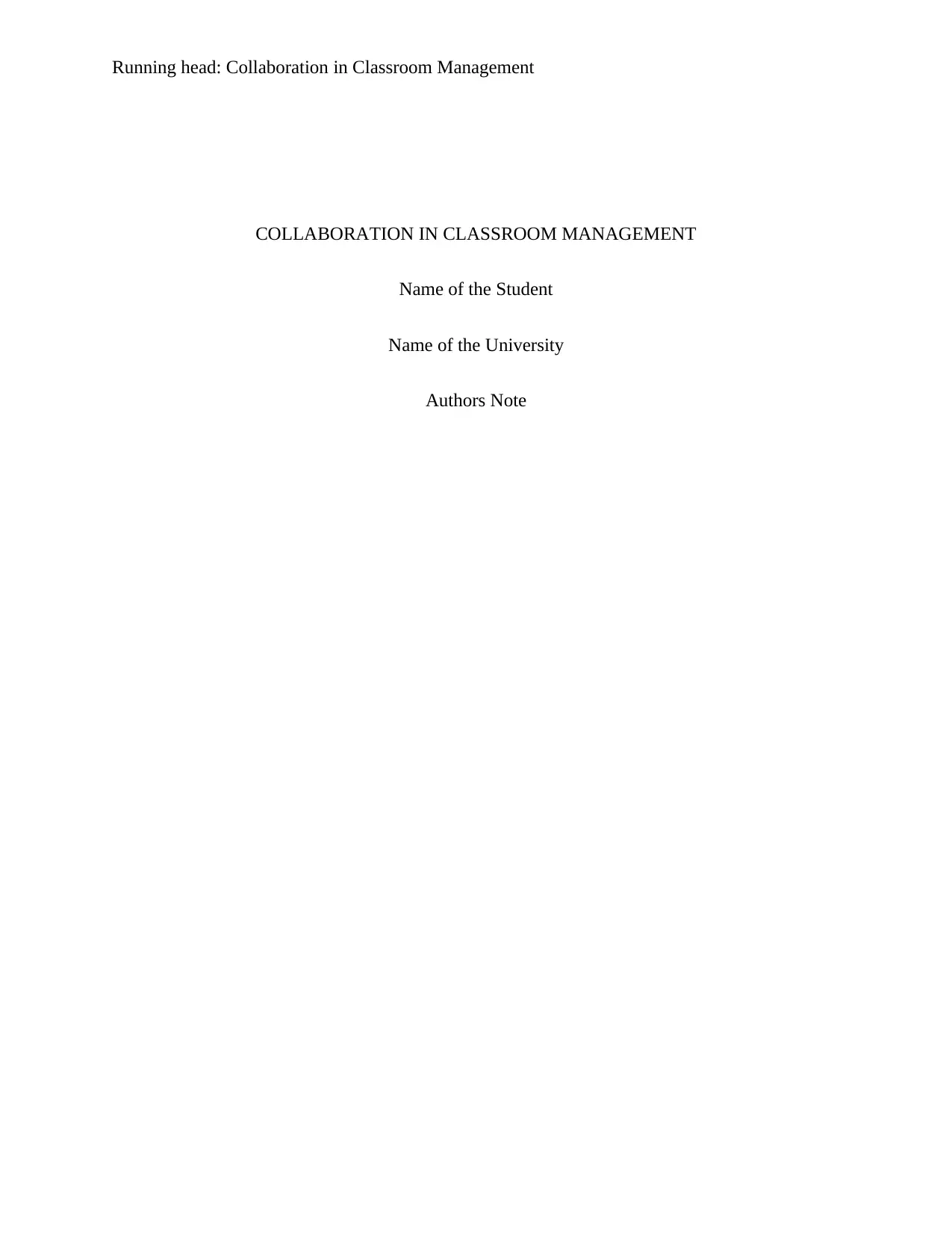
Running head: Collaboration in Classroom Management
COLLABORATION IN CLASSROOM MANAGEMENT
Name of the Student
Name of the University
Authors Note
COLLABORATION IN CLASSROOM MANAGEMENT
Name of the Student
Name of the University
Authors Note
Paraphrase This Document
Need a fresh take? Get an instant paraphrase of this document with our AI Paraphraser
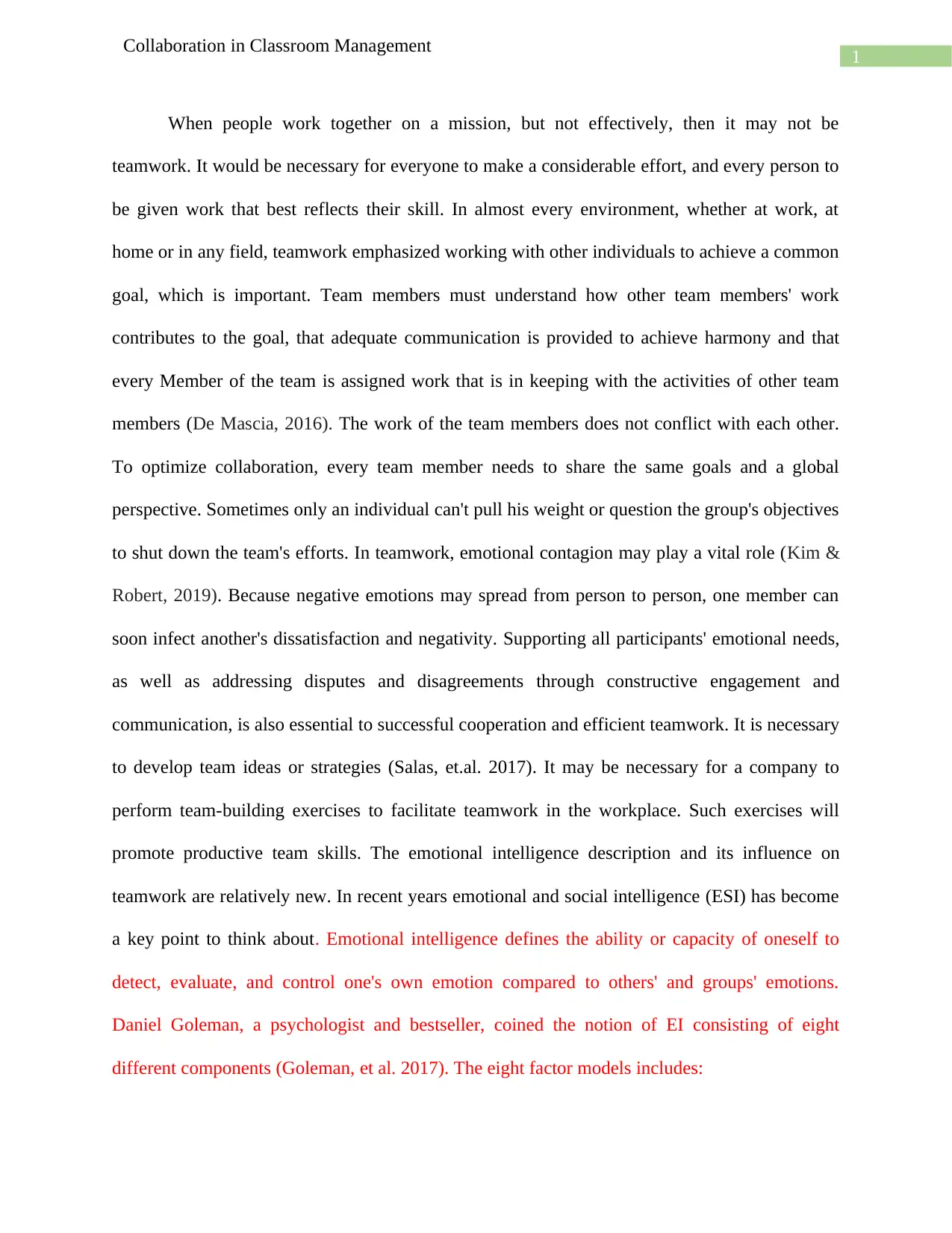
1
Collaboration in Classroom Management
When people work together on a mission, but not effectively, then it may not be
teamwork. It would be necessary for everyone to make a considerable effort, and every person to
be given work that best reflects their skill. In almost every environment, whether at work, at
home or in any field, teamwork emphasized working with other individuals to achieve a common
goal, which is important. Team members must understand how other team members' work
contributes to the goal, that adequate communication is provided to achieve harmony and that
every Member of the team is assigned work that is in keeping with the activities of other team
members (De Mascia, 2016). The work of the team members does not conflict with each other.
To optimize collaboration, every team member needs to share the same goals and a global
perspective. Sometimes only an individual can't pull his weight or question the group's objectives
to shut down the team's efforts. In teamwork, emotional contagion may play a vital role (Kim &
Robert, 2019). Because negative emotions may spread from person to person, one member can
soon infect another's dissatisfaction and negativity. Supporting all participants' emotional needs,
as well as addressing disputes and disagreements through constructive engagement and
communication, is also essential to successful cooperation and efficient teamwork. It is necessary
to develop team ideas or strategies (Salas, et.al. 2017). It may be necessary for a company to
perform team-building exercises to facilitate teamwork in the workplace. Such exercises will
promote productive team skills. The emotional intelligence description and its influence on
teamwork are relatively new. In recent years emotional and social intelligence (ESI) has become
a key point to think about. Emotional intelligence defines the ability or capacity of oneself to
detect, evaluate, and control one's own emotion compared to others' and groups' emotions.
Daniel Goleman, a psychologist and bestseller, coined the notion of EI consisting of eight
different components (Goleman, et al. 2017). The eight factor models includes:
Collaboration in Classroom Management
When people work together on a mission, but not effectively, then it may not be
teamwork. It would be necessary for everyone to make a considerable effort, and every person to
be given work that best reflects their skill. In almost every environment, whether at work, at
home or in any field, teamwork emphasized working with other individuals to achieve a common
goal, which is important. Team members must understand how other team members' work
contributes to the goal, that adequate communication is provided to achieve harmony and that
every Member of the team is assigned work that is in keeping with the activities of other team
members (De Mascia, 2016). The work of the team members does not conflict with each other.
To optimize collaboration, every team member needs to share the same goals and a global
perspective. Sometimes only an individual can't pull his weight or question the group's objectives
to shut down the team's efforts. In teamwork, emotional contagion may play a vital role (Kim &
Robert, 2019). Because negative emotions may spread from person to person, one member can
soon infect another's dissatisfaction and negativity. Supporting all participants' emotional needs,
as well as addressing disputes and disagreements through constructive engagement and
communication, is also essential to successful cooperation and efficient teamwork. It is necessary
to develop team ideas or strategies (Salas, et.al. 2017). It may be necessary for a company to
perform team-building exercises to facilitate teamwork in the workplace. Such exercises will
promote productive team skills. The emotional intelligence description and its influence on
teamwork are relatively new. In recent years emotional and social intelligence (ESI) has become
a key point to think about. Emotional intelligence defines the ability or capacity of oneself to
detect, evaluate, and control one's own emotion compared to others' and groups' emotions.
Daniel Goleman, a psychologist and bestseller, coined the notion of EI consisting of eight
different components (Goleman, et al. 2017). The eight factor models includes:
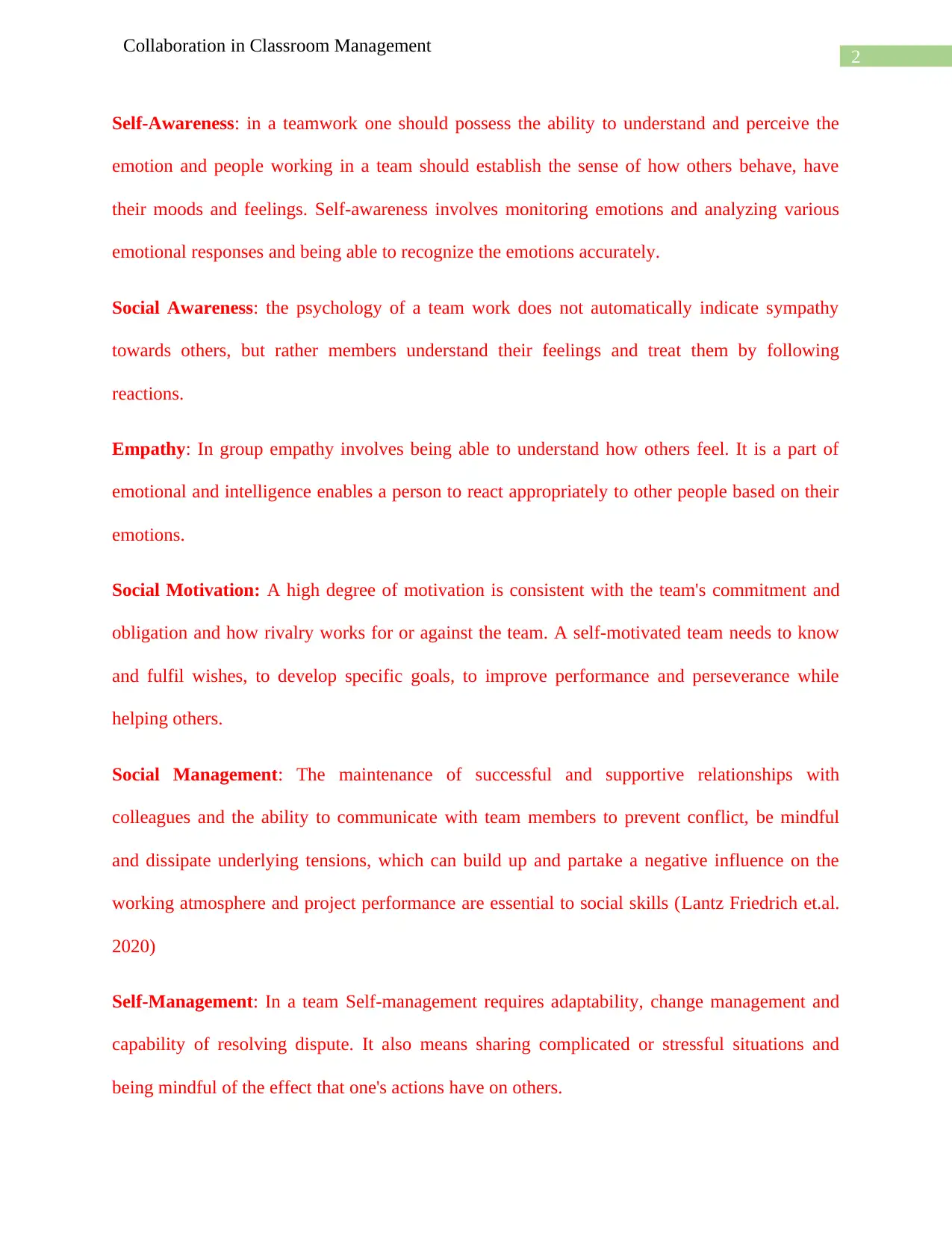
2
Collaboration in Classroom Management
Self-Awareness: in a teamwork one should possess the ability to understand and perceive the
emotion and people working in a team should establish the sense of how others behave, have
their moods and feelings. Self-awareness involves monitoring emotions and analyzing various
emotional responses and being able to recognize the emotions accurately.
Social Awareness: the psychology of a team work does not automatically indicate sympathy
towards others, but rather members understand their feelings and treat them by following
reactions.
Empathy: In group empathy involves being able to understand how others feel. It is a part of
emotional and intelligence enables a person to react appropriately to other people based on their
emotions.
Social Motivation: A high degree of motivation is consistent with the team's commitment and
obligation and how rivalry works for or against the team. A self-motivated team needs to know
and fulfil wishes, to develop specific goals, to improve performance and perseverance while
helping others.
Social Management: The maintenance of successful and supportive relationships with
colleagues and the ability to communicate with team members to prevent conflict, be mindful
and dissipate underlying tensions, which can build up and partake a negative influence on the
working atmosphere and project performance are essential to social skills (Lantz Friedrich et.al.
2020)
Self-Management: In a team Self-management requires adaptability, change management and
capability of resolving dispute. It also means sharing complicated or stressful situations and
being mindful of the effect that one's actions have on others.
Collaboration in Classroom Management
Self-Awareness: in a teamwork one should possess the ability to understand and perceive the
emotion and people working in a team should establish the sense of how others behave, have
their moods and feelings. Self-awareness involves monitoring emotions and analyzing various
emotional responses and being able to recognize the emotions accurately.
Social Awareness: the psychology of a team work does not automatically indicate sympathy
towards others, but rather members understand their feelings and treat them by following
reactions.
Empathy: In group empathy involves being able to understand how others feel. It is a part of
emotional and intelligence enables a person to react appropriately to other people based on their
emotions.
Social Motivation: A high degree of motivation is consistent with the team's commitment and
obligation and how rivalry works for or against the team. A self-motivated team needs to know
and fulfil wishes, to develop specific goals, to improve performance and perseverance while
helping others.
Social Management: The maintenance of successful and supportive relationships with
colleagues and the ability to communicate with team members to prevent conflict, be mindful
and dissipate underlying tensions, which can build up and partake a negative influence on the
working atmosphere and project performance are essential to social skills (Lantz Friedrich et.al.
2020)
Self-Management: In a team Self-management requires adaptability, change management and
capability of resolving dispute. It also means sharing complicated or stressful situations and
being mindful of the effect that one's actions have on others.
⊘ This is a preview!⊘
Do you want full access?
Subscribe today to unlock all pages.

Trusted by 1+ million students worldwide
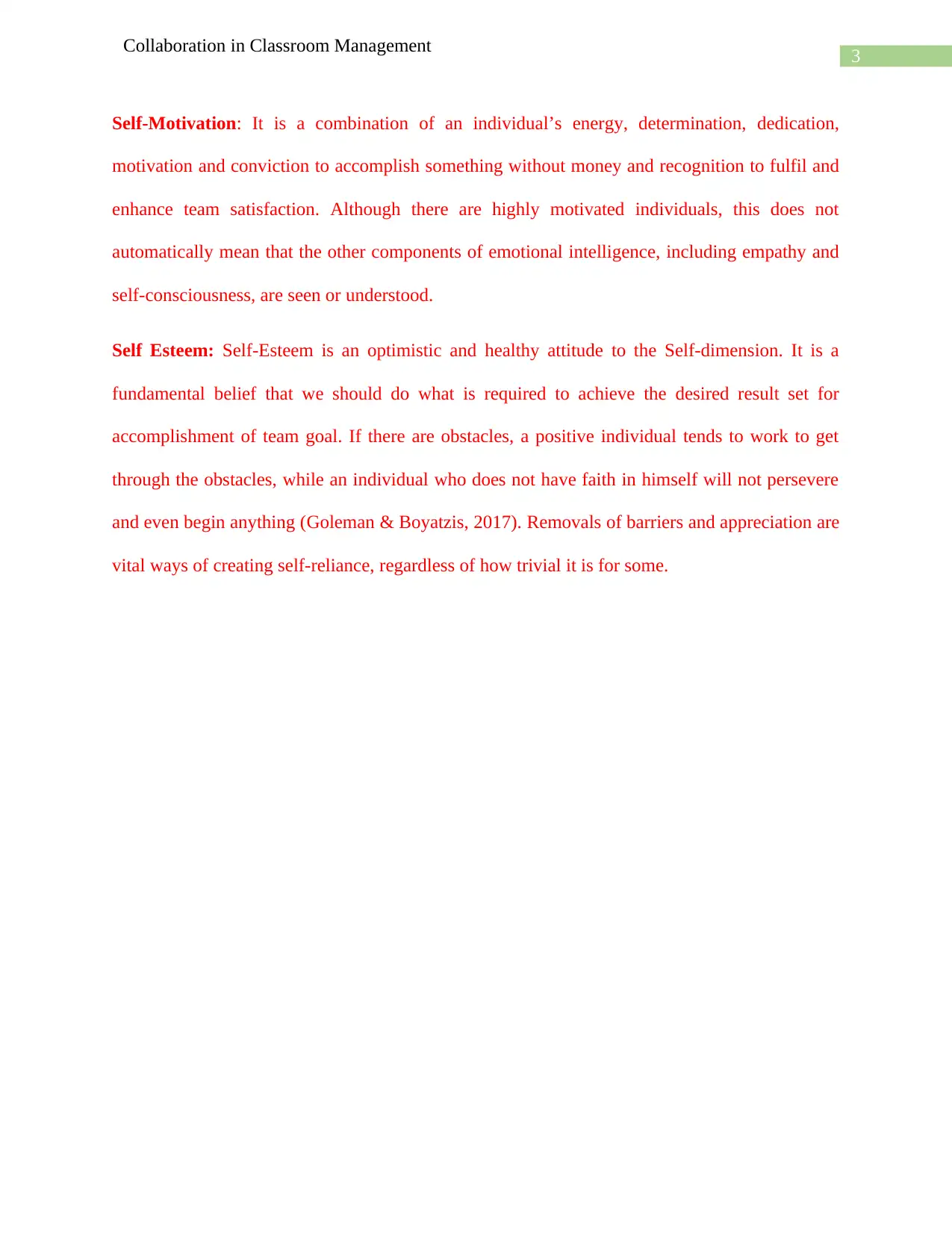
3
Collaboration in Classroom Management
Self-Motivation: It is a combination of an individual’s energy, determination, dedication,
motivation and conviction to accomplish something without money and recognition to fulfil and
enhance team satisfaction. Although there are highly motivated individuals, this does not
automatically mean that the other components of emotional intelligence, including empathy and
self-consciousness, are seen or understood.
Self Esteem: Self-Esteem is an optimistic and healthy attitude to the Self-dimension. It is a
fundamental belief that we should do what is required to achieve the desired result set for
accomplishment of team goal. If there are obstacles, a positive individual tends to work to get
through the obstacles, while an individual who does not have faith in himself will not persevere
and even begin anything (Goleman & Boyatzis, 2017). Removals of barriers and appreciation are
vital ways of creating self-reliance, regardless of how trivial it is for some.
Collaboration in Classroom Management
Self-Motivation: It is a combination of an individual’s energy, determination, dedication,
motivation and conviction to accomplish something without money and recognition to fulfil and
enhance team satisfaction. Although there are highly motivated individuals, this does not
automatically mean that the other components of emotional intelligence, including empathy and
self-consciousness, are seen or understood.
Self Esteem: Self-Esteem is an optimistic and healthy attitude to the Self-dimension. It is a
fundamental belief that we should do what is required to achieve the desired result set for
accomplishment of team goal. If there are obstacles, a positive individual tends to work to get
through the obstacles, while an individual who does not have faith in himself will not persevere
and even begin anything (Goleman & Boyatzis, 2017). Removals of barriers and appreciation are
vital ways of creating self-reliance, regardless of how trivial it is for some.
Paraphrase This Document
Need a fresh take? Get an instant paraphrase of this document with our AI Paraphraser
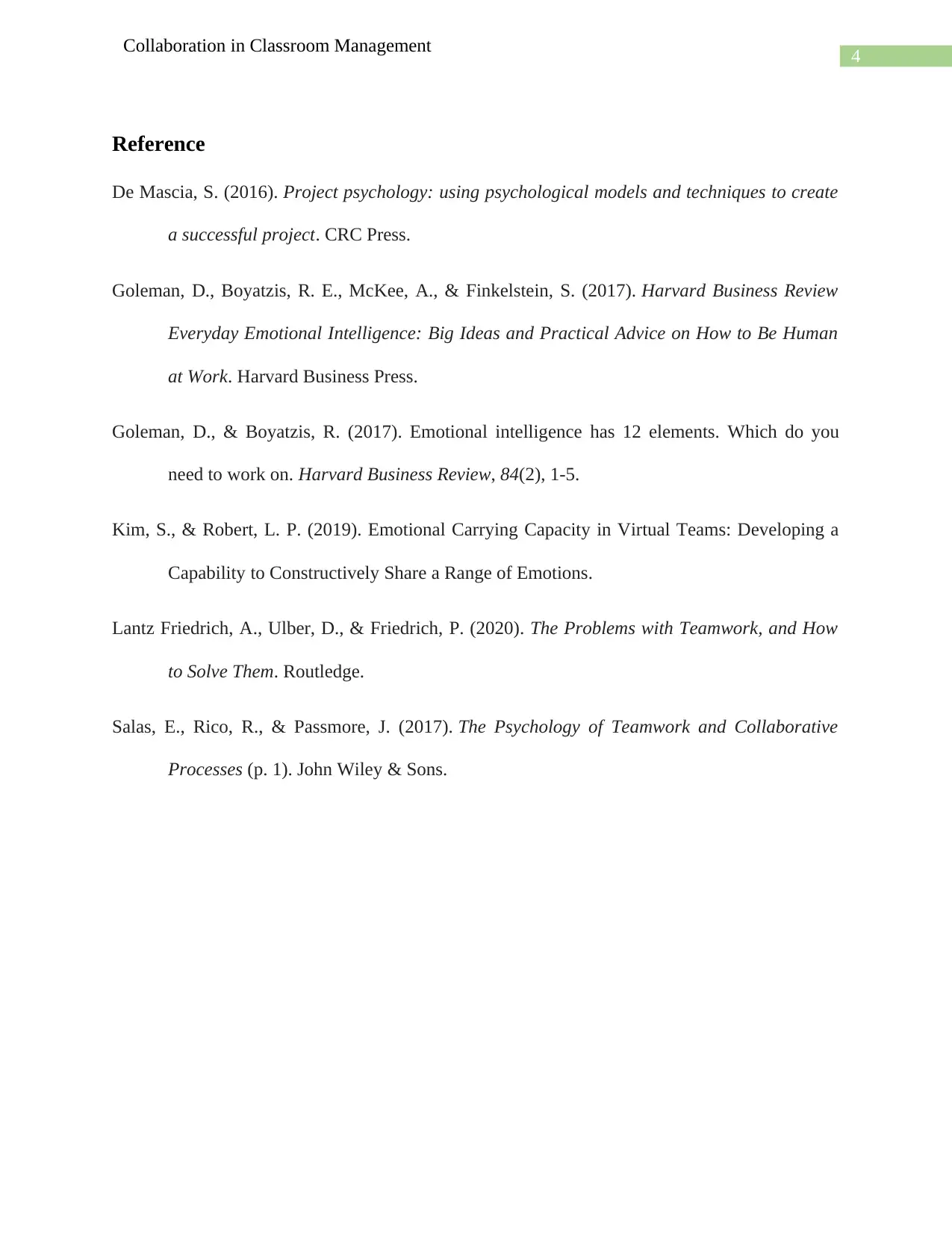
4
Collaboration in Classroom Management
Reference
De Mascia, S. (2016). Project psychology: using psychological models and techniques to create
a successful project. CRC Press.
Goleman, D., Boyatzis, R. E., McKee, A., & Finkelstein, S. (2017). Harvard Business Review
Everyday Emotional Intelligence: Big Ideas and Practical Advice on How to Be Human
at Work. Harvard Business Press.
Goleman, D., & Boyatzis, R. (2017). Emotional intelligence has 12 elements. Which do you
need to work on. Harvard Business Review, 84(2), 1-5.
Kim, S., & Robert, L. P. (2019). Emotional Carrying Capacity in Virtual Teams: Developing a
Capability to Constructively Share a Range of Emotions.
Lantz Friedrich, A., Ulber, D., & Friedrich, P. (2020). The Problems with Teamwork, and How
to Solve Them. Routledge.
Salas, E., Rico, R., & Passmore, J. (2017). The Psychology of Teamwork and Collaborative
Processes (p. 1). John Wiley & Sons.
Collaboration in Classroom Management
Reference
De Mascia, S. (2016). Project psychology: using psychological models and techniques to create
a successful project. CRC Press.
Goleman, D., Boyatzis, R. E., McKee, A., & Finkelstein, S. (2017). Harvard Business Review
Everyday Emotional Intelligence: Big Ideas and Practical Advice on How to Be Human
at Work. Harvard Business Press.
Goleman, D., & Boyatzis, R. (2017). Emotional intelligence has 12 elements. Which do you
need to work on. Harvard Business Review, 84(2), 1-5.
Kim, S., & Robert, L. P. (2019). Emotional Carrying Capacity in Virtual Teams: Developing a
Capability to Constructively Share a Range of Emotions.
Lantz Friedrich, A., Ulber, D., & Friedrich, P. (2020). The Problems with Teamwork, and How
to Solve Them. Routledge.
Salas, E., Rico, R., & Passmore, J. (2017). The Psychology of Teamwork and Collaborative
Processes (p. 1). John Wiley & Sons.
1 out of 5
Related Documents
Your All-in-One AI-Powered Toolkit for Academic Success.
+13062052269
info@desklib.com
Available 24*7 on WhatsApp / Email
![[object Object]](/_next/static/media/star-bottom.7253800d.svg)
Unlock your academic potential
Copyright © 2020–2026 A2Z Services. All Rights Reserved. Developed and managed by ZUCOL.




